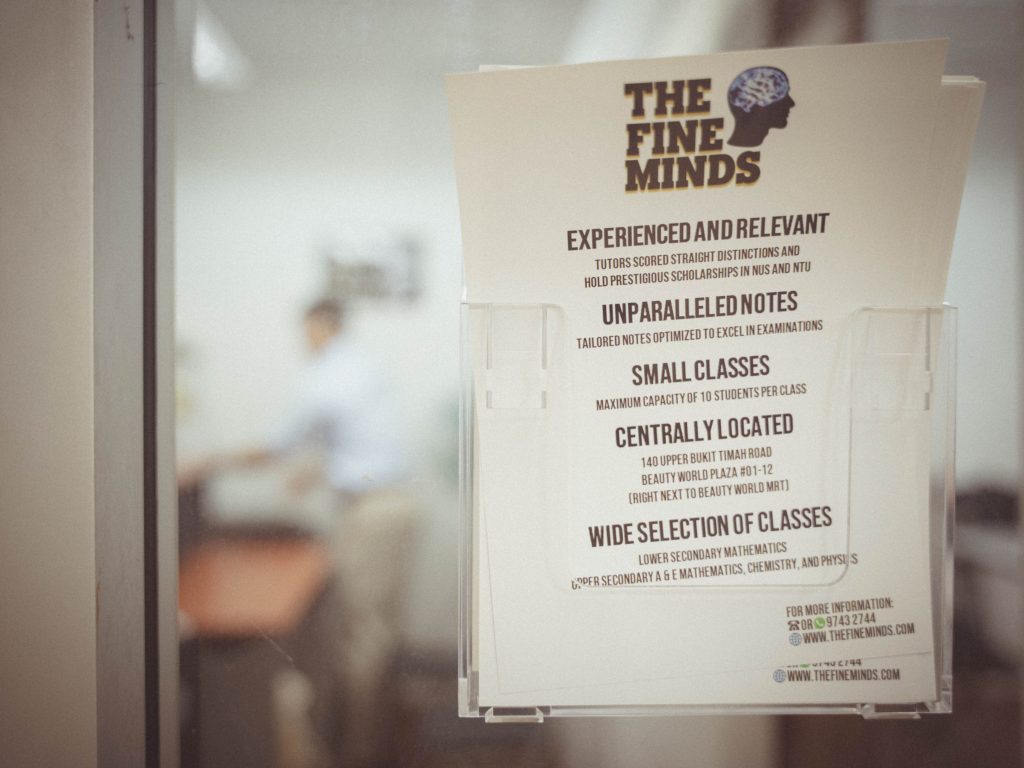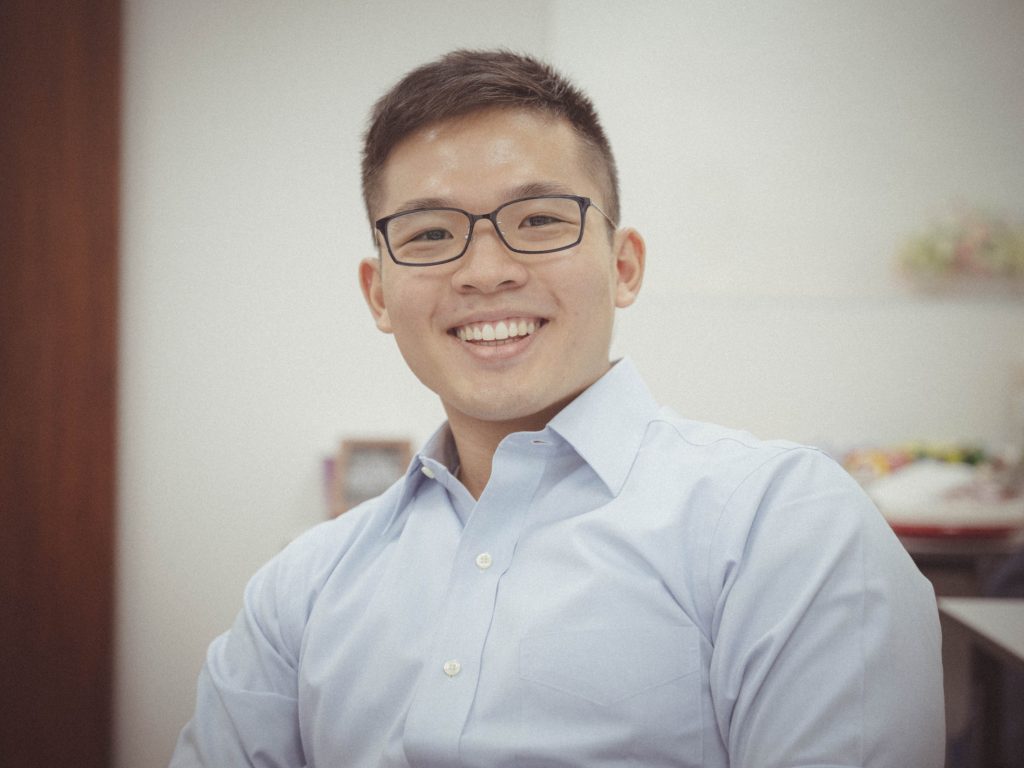As of 2020, there are more than 1000 tuition centres in Singapore. One of them is The Fine Minds (TFM), run by a group of 21-year-olds, dedicated to teaching secondary school students.
Warren and Jin Xuan met during their time in NS, and started to think of ways to earn their allowance after ORD. They both had experience doing one-to-one tutoring, which gave them the idea to start a tuition centre together. Joshua, Warren’s long-time friend since secondary one, joined after Warren talked him into it.
“We’re quite a risk-taking bunch,” Jin Xuan remarked.
With only the “peanuts” salary they received from NS, they started searching for rental units to set up their business.
I visited their centre in Beauty World Plaza. It was about the size of a living room, with only one spacious classroom and a small office space.

They managed to secure the unit for $500 in rental and takeover fees.
“But our first negotiation with the real estate agent (for another unit) fell through. They were super rude and unprofessional. When they see such a young face, they don’t take you seriously,” Warren said.
They simultaneously set up their website using Squarespace: “It was very easy, we finished setting it up within the free trial.”
Just like any Gen Z, they learnt the ropes online: from crafting the Terms and Conditions; to finding out about the different types of business entities, and doing market research on other tuition centres in the area to get a better sense of the competition.

The first step, and by far the biggest challenge, was to find students to enrol.
They started giving out flyers at schools; at public spaces like MRT stations; dropping them off at mailboxes and so on. “It was very tiring. And I’d say there was zero success.” They only got one phone call, but no follow-up after two to three weeks.
Then they tried giving one month free trials. That was when their first student arrived after learning about them through word of mouth in a parent support group.
She had failed her end-of-year exams and needed a retest to see if she could graduate to the next year. So the team gave her a crash course during the month-long free trial for Biology and Physics.
Joshua beamed with pride, “She managed to pass. Now she’s with us for Bio, Physics and Math and she’s topping the class.”
But the trio still didn’t see much success with implementing a free trial period. Students were interested in the centre, but there was no guarantee they’d enrol for classes and stay.
According to them, secondary school students don’t take as much initiative as JC students and aren’t as keen on free trials. So they decided to go for something more attractive.
They started giving out free AirPods to every new student who signed up.
“People thought: ‘giving away AirPods is freaking crazy, what a huge investment, you’re giving away the first month of your income,’” Warren said.
He explained, “The net result would’ve been the same as the free trial. And the AirPods markets itself, Apple does the marketing.” They also marketed the earphones as a meaningful tool to help students study, with its noise cancellation functions.
It proved to be successful. They had 10 to 15 new sign-ups that month. They also managed to get their name out on social media: “It became quite a big thing on Instagram. People started sharing our posts on their stories.” Even the students who have never attended their classes before knew of them.
On that note, Jin Xuan believes their strong social media presence contributed to their marketing success, as compared to other centres that mainly rely on free trials.
From thereon, students stayed after attending their classes and realising the substance the trio had to offer, and they started to gain credibility.

While they held more classes or provided discounts to stay afloat, TFM’s students continued to attend their classes every week, with minimal adjustments. In fact, there were still one or two newcomers who sat in for a trial class.
Part of this was due to their tech-savviness, which allowed for a smooth transition to online classes.
“The announcement (of businesses having to close) was very sudden. But we managed to come up with a plan in a day,” Joshua said.
Warren exclaimed, “I know of tutors whose students had to teach them how to mute and unmute over Zoom!”
They did, however, struggle with gaining parents’ trust in the beginning.
Understandably, these three young men had barely stepped foot in university a year ago during the business’ inception. What sets their centre apart from other teachers with professional degrees and more decorated CVs?
But they managed to overcome that by holding a free trial class for these parents’ children.
“When we could actually have the opportunity to tutor their kids, they could see the positive impact.” Since then, the support from parents has been heartening, with most of them sending well wishes from time to time.
“Now, a lot of them view us as role models for their kids, not just teachers,” Warren said.
Other centres also looked at the newcomers with skepticism. Warren recounts an unpleasant experience with a particular owner of a more established tuition centre: “My niece quit his tuition centre to join mine. Then he said, ‘You join a tuition centre that has to resort to giving out AirPods to get students?’”
He was visibly upset, “I just told him that this is a very saturated market and that we want to make our presence known in the industry, and if it means doing something good for our students, we’ll do it.”
For the most part, they’ve managed to stand out by establishing the centre’s core values: stay approachable and have empathy for your students.
“I learnt my best from friends and seniors when I was in school,” Warren said. And that was how they decided to build their brand. The mantra is simple yet persuasive: ‘I’ve walked in your shoes before, you can listen to me’.

Jin Xuan raised the idea of holding gatherings and outings for their students during the school holidays, where they’d play games and order food for them: “We always want to gain their trust and bond with them.” In turn, their students look forward to coming to classes.
It’s uncommon to see tuition centres with this sort of relationship being established between the teacher and student. The trio agreed that many tutors don’t know what it’s like being a student today.
“We get doubted because of our age but I’d think that other centres’ teachers would get doubted because of their age also,” Warren said.
Most tutors in other centres aren’t owners of the centres as well. And the three believe it’s hard to come to a consensus on how to run the business if the two (owners and tutors) are kept separate. “For us, it’s the same thing. So whatever [the] money, we just agree among ourselves.”
Even with the notes they design for their students, they try to incorporate as many “tips and tricks” that personally worked for them in the past, instead of rehashing the syllabus from existing textbooks, which is the approach many other centres take.

For Joshua, it has always been something he wanted to do. He wanted to join the relief teaching programme MOE offered after ‘A’ Levels, but couldn’t make it for all the (teaching) sessions. Jin Xuan and Warren discovered a passion for tutoring while teaching their peers during secondary school and JC.

“When my family and relatives heard about it, they said, ‘Why you go and do business, don’t you know it’s very risky? Do you know what you’re getting yourself into?’” Joshua sighed.
His grandfather had a failed business in the past, which made his parents hesitant of the risks the three were taking. Like many parents in Singapore, they wanted Joshua to follow the conventional path: find an internship after NS, get a degree, and eventually, a stable job. “But I guess I managed to convince them,” he said, “They could see I was passionate about it.”
For Warren, taking a logical approach to persuasion was key to convincing his mother: “I just told her ‘this is the math, my rent is this much, I need to get this number of students to break even every month, I think I can do it’.”
Especially because we did well in school, it’s a guaranteed path to quite a successful life. If you just go to uni, do well, get a job, you’ll be fine. So why go and take unnecessary risk, in a position where you can fail?
Success came in the form of students who excelled during exams and got in touch to express their gratitude.
Joshua spoke of a few students who didn’t take their studies seriously when they first enrolled in the centre. Now, they’re willing to learn and have a more open attitude to putting in the hard work.
“To see them develop and mature as a person, and asking more questions after class … it’s very fulfilling,” he mused.
Jin Xuan, likewise, lights up when he sees his students gain confidence after they improve their studies: “It’s the best feeling ever.”
On financial success, Warren insists they can’t take their students for granted, since “they can leave anytime”. There’s no point focusing on a business strategy if their craft isn’t up to standard: “Anyone can set up a restaurant business. But if the chef cooks shit food, there won’t be any returning customers.”

They maintain that their students will always be their priority: “We won’t leave them out to dry. If it’s not us teaching, then it’ll be a very capable teacher teaching.”
They also wish to retain their ‘relatability’ approach to teaching, should they have to hire more tutors: “If we see someone who really has the passion and the students relate to them, then we’ll hire them.”
Warren adds, “Success would also be giving people like us a shot also, and not just holding onto our business for dear life.”
For the next few years, however, they’ll still be the mainstays in the centre. They’re committed to doing this full-time, even as they begin university this month.
As for the advice they have to give to Gen Zs who want to start their own business, they believe it’s better to pursue it while they’re young, when their minds are the most mouldable and receptive to learning from experience.
“People always say ‘I want to work x number of years, then I’ll start a business when I can afford to take the risk’. But we honestly believe you should take risk earlier on.”

But had things not gone according to plan, they wouldn’t have regretted any of it. They all agree they haven’t sacrificed their youth for the business:
“I think this is how I’d like to spend my youth,” Warren said.
Joshua chimed in, “It’s one of the highlights of my life I’ll look back on and be thankful for.”






